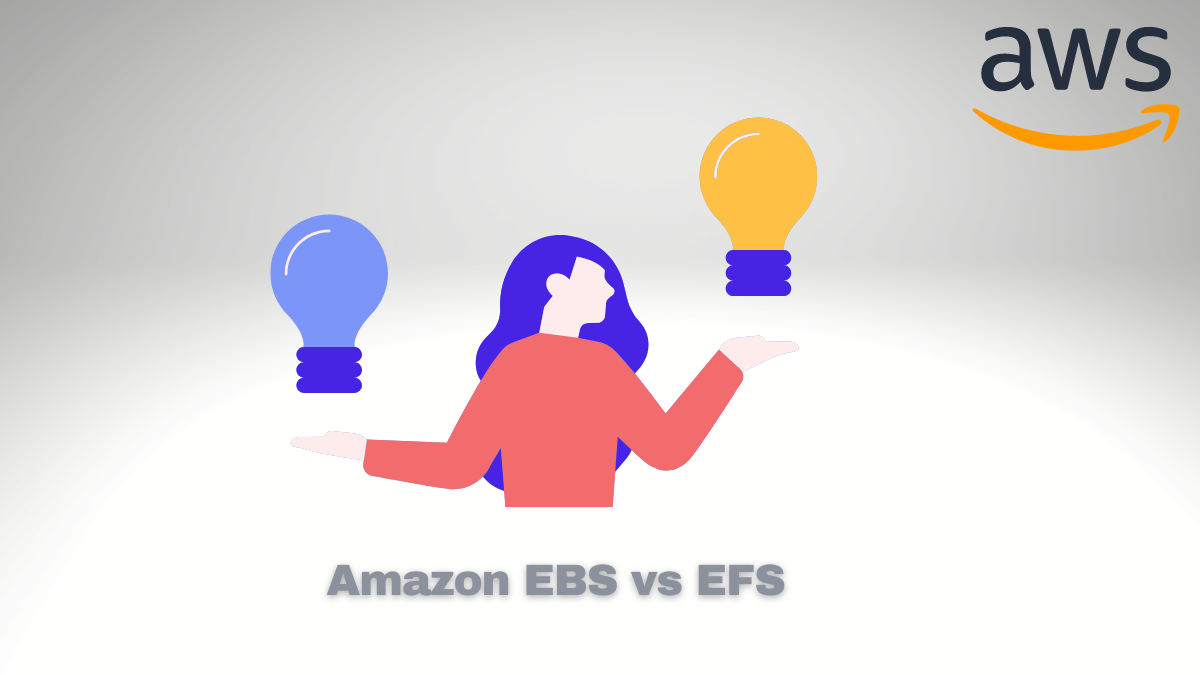EBS vs EFS: A Deeper Look at AWS Cloud Storage Services

Amazon Web Services (AWS) offers cloud storage services to support various storage workloads.
These services—Amazon Elastic File System (EFS), Amazon Elastic Block Store (EBS), and Amazon Simple Storage Service (S3)—all provide different levels of performance, durability, and scalability. Let’s take a look at each one in more detail.
EBS vs EFS
Amazon EFS (Elastic File System) and EBS (Elastic Block Store) are both storage services provided by Amazon Web Services (AWS). Still, they significantly differ in architecture, performance, and use cases.
Architecture:
EFS is a managed network file system with multiple Amazon Elastic Compute Cloud (EC2) instances that can be accessed simultaneously. It is built on top of the Network File System (NFS) protocol, which allows it to offer a fully managed and scalable file system service.
EBS, on the other hand, provides block-level storage that can be attached to a single EC2 instance at a time. EBS volumes are created from virtualized storage blocks, which are exposed to the EC2 instance as local disks.
Performance:
EFS is designed to provide scalable, highly available, and durable file storage for applications and services requiring shared file access. It is optimized for high throughput and low latency performance, making it ideal for workloads that require frequent read/write operations and large-scale file sharing.
EBS is optimized for low-latency, high-throughput workloads that require fast access to persistent block-level storage. It offers a range of volume types, including SSD-backed and HDD-backed volumes, to meet different performance requirements.
Use Cases:
EFS is ideal for use cases requiring shared file data access, such as content management systems, media processing workflows, and data analytics applications. It can also be used for shared home directories, application configurations, and development environments.
EBS, on the other hand, is ideal for use cases that require persistent block-level storage, such as database hosting, transaction processing, and boot volumes for EC2 instances. It can also be used to store data that needs to be frequently accessed, such as logs, backups, and snapshots.
In summary, while both EFS and EBS are storage services provided by AWS, they have different architectures, performance characteristics, and use cases.
EFS is a fully managed, scalable file system that is ideal for shared access to file data. At the same time, EBS is a block-level storage service optimized for low-latency, high-throughput workloads that require fast access to persistent storage.
EBS vs. EFS: A Comprehensive Comparison
Amazon Web Services (AWS) offers two powerful storage solutions: Amazon Elastic File System (EFS) and Amazon Elastic Block Store (EBS). Understanding their differences is crucial for choosing the right storage solution for your needs.
Key Differences at a Glance
| Feature | Amazon EFS | Amazon EBS |
|---|---|---|
| Architecture | Managed network file system | Block-level storage attached to EC2 instances |
| Performance | High throughput and low latency | Low latency and high throughput |
| Use Cases | Shared access to file data | Persistent block-level storage, database hosting, transaction processing, boot volumes |
| Access | Multiple EC2 instances | Single EC2 instance |
| Protocols | NFS | Direct attached storage |
| Availability | Multiple Availability Zones | Single Availability Zone |
| Pricing | Pay per GB-month of storage | Pay per GB-month of provisioned storage |
On-Premises Compatibility
EBS
- Not available for on-premises use
- Strictly limited to AWS cloud environment
EFS
- Can be used with on-premises systems
- Requires either:
- AWS Direct Connect
- AWS VPN connection to your Virtual Private Cloud (VPC)
- Supports NFS v4.1 protocol for mounting on Linux servers
Making the Right Choice
AWS storage services (EFS, EBS, and S3) each excel in different scenarios:
- High-Performance Computing
- Media streaming
- Real-time data processing
- Mission-Critical Operations
- Disaster recovery
- Database hosting
- Data Management
- Long-term archiving
- Shared file systems
Choose based on your specific requirements for:
- Performance
- Durability
- Scalability
- Cost efficiency
EBS vs EFS – Pricing
Sure, there’s a deeper price comparison between Amazon EFS and EBS:
Amazon EFS pricing:
- Standard storage: $0.30 per GB-month
- Infrequent access storage: $0.025 per GB-month
- Lifecycle management: $0.01 per 1,000 PUT requests
- Data transfer: $0.01 per GB for data transfer in and $0.01 per GB for data transfer out
- Requests: $0.30 per million requests
Amazon EBS pricing:
- General Purpose SSD (gp2) volumes: $0.10 per GB-month of provisioned storage
- Provisioned IOPS SSD (io1) volumes: $0.125 per GB-month of provisioned storage + $0.065 per provisioned IOPS-month
- Throughput Optimized HDD (st1) volumes: $0.045 per GB-month of provisioned storage
- Cold HDD (sc1) volumes: $0.025 per GB-month of provisioned storage
- Snapshots: $0.05 per GB-month of data stored
- Data transfer: $0.05 per GB for data transfer in and $0.05 per GB for data transfer out
- Requests: $0.05 per million I/O requests
Regarding pricing, Amazon EFS tends to be more expensive than Amazon EBS. However, it’s worth noting that EFS pricing includes data transfers and requests, while EBS pricing does not. Therefore, EFS can be a more cost-effective option if your workload involves frequent data transfers or requests.
EBS offers various volume types, each with its price points and performance characteristics. This allows you to select the correct volume type to meet your workload requirements and budget.
Ultimately, the choice between Amazon EFS and EBS will depend on your specific use case and requirements. When deciding, it would be best to consider factors such as access patterns, performance requirements, data transfer and request volumes, and budget.
Conclusion
AWS offers three powerful cloud storage services—EFS, EBS, and S3—each designed to meet different storage needs. These services provide varying levels of:
- Performance
- Durability
- Scalability
This variety allows you to choose the perfect storage solution for your specific workload requirements. Whether you need:
- High-performance computing applications for media streaming
- Mission-critical disaster recovery solutions
- Long-term data archiving capabilities
AWS provides the right solution for your needs. Take advantage of these powerful tools to optimize your cloud infrastructure today!




Comments